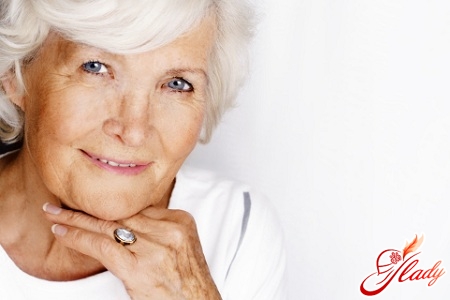 Old age is a wonderful time!But not everyone knows about it, and many will even argue. For most people, old age is illness, helplessness, boredom and monotony. Therefore, when a person reaches a certain age, he already feels doomed. However, everything is far from pessimistic. The psychological possibilities of old age, which many people simply do not notice, can be very large and amazing. If for some reason this issue is relevant to you, then after reading this article, you will be able to optimistically and in a new way look at the prospects opening up before you.
Old age is a wonderful time!But not everyone knows about it, and many will even argue. For most people, old age is illness, helplessness, boredom and monotony. Therefore, when a person reaches a certain age, he already feels doomed. However, everything is far from pessimistic. The psychological possibilities of old age, which many people simply do not notice, can be very large and amazing. If for some reason this issue is relevant to you, then after reading this article, you will be able to optimistically and in a new way look at the prospects opening up before you.
At what point does old age come?
Many people ask themselves the question:“When will I become old?” This may surprise you, but there is no clear and uniform boundary for everyone. Scientists prefer to start from the physiological causes of old age, since most psychological changes are associated with them. Menopause is often cited as the main reason. The duration of menopause can vary from one year to ten years, and the peak is on average at fifty to fifty-five years. Currently, there is debate about whether menopause also occurs in men, or whether it only happens to women. But even if hormonal changes are perhaps the lot of women, both sexes are subject to psychological changes. These changes go through a number of stages in their development:
The above changes occurring inold age, are very closely tied to menopause. However, the boundaries of old age should not necessarily be based on physiological changes. Old age as a psychological problem depends on the norms accepted in society, which are based on the age and lifestyle of the elderly person. In particular, the following boundaries for old age can be proposed:
It is obvious that the boundaries of old age are very, veryare blurred. Someone feels like a deep old woman at fifty, and for others, even seventy is not an obstacle to an active and interesting life. Agree, the secret of a happy old age is worth a lot! For example, in the West there is such a concept as the “third age” - this is the time after a person retires. It is filled with travel, concerts and various hobbies such as collecting or calligraphy. And even when strength decreases, the “fourth age” comes - a period that is not so active, but also quite prosperous - this is a calmer and wiser old age. So what does our future depend on?
What does the coming old age have in store for us?
There are a lot of changes coming -some of them are better, some are worse, and some you just have to get used to. These are the so-called psychological characteristics of old age. In any case, if they did not exist, old age would not be a new stage in our lives. First of all, the changes affect the human psyche. Obviously, visual and auditory acuity, attention and memory decrease. But with memory, in fact, everything is not so simple: mainly long-term memory suffers, i.e. everything that happened a long time ago and a very long time ago is easier to forget. But at the same time, older people remember well everything that interests them, as well as all the events that are important to them. Learning ability decreases - this is why it is so difficult to master a computer in old age. However, someone succeeds, which means that this process largely depends on interest and attitude towards it. Intelligence and thinking are worth mentioning separately. In order for them to remain at the proper level in old age, it is necessary to use special aids, for example, grouping material by meaning, engaging all the senses and spending more time on thinking. However, that is not all: psychologists have compiled a whole list of factors that have a beneficial effect on intelligence:
- absence of cardiovascular and other chronic diseases;
- favorable environmental conditions;
- income level is above average;
- warm family climate;
- Participation in cases that promote the development of cognitive abilities;
- a spouse with a high intellect;
- satisfaction with life;
- personal flexibility;
The psychological characteristics of old age also includeThere are also strong changes in a person's personality and character. Vital energy and tone decrease, an elderly person becomes less active. Many people experience a decrease in emotionality, especially those who used to live a stormy and emotionally intense life - they come to calm. The range of their feelings narrows, sometimes all love is concentrated on someone, for example, a grandchild. Some helplessness, compliance and suggestibility appear. This is especially important in the sense that it is necessary to protect your elderly relatives from the influence of scammers. The range of interests narrows. You yourself have repeatedly heard that elderly people talk only about their ailments, desires and needs, or about how bad it is to live in Rus'. All this can be accompanied by increased irritability and emotional reactions. By the way, sometimes such a phenomenon as a change in some character trait to the opposite occurs: for example, a formerly generous person suddenly becomes stingy, which, naturally, does not find support from others. In general, older people become quite egocentric. It is also necessary to remember the phenomenon of dissocialization. It characterizes the peculiarities of communication of older people, and, as the name suggests, denotes the loss of opportunities for full interaction with others. Unfortunately, this is a fact, and perhaps this is why many older people have such a difficult character. It is difficult for them to satisfy their need for communication, and they even come to a therapist and to the post office in order to talk (which greatly irritates other people). This phenomenon has several sources:
However, everything is not so sad and hopeless -There are factors that prevent dissociation. This may include a balanced nervous system and high extroversion, but the attitude towards the elderly that has developed in society is of the greatest importance. For example, in Abkhazia, young people respect the elderly - they are a symbol of wisdom for them - and pay great attention to communicating with them. Thanks to this, most elderly people are happy with their lives. This is also reflected in the social sphere: in Abkhazia, there are no criminal elderly people or crimes against the elderly. It is also necessary to take into account that as an elderly person ages, the role of the family in his or her life increases. After all, it is family contact that can replace other lost types. Deteriorating health, which increases with the years, makes an aging person increasingly dependent on other family members - he or she needs their help and care. When an elderly person is within the family, he or she is able to feel safe and independent from the problems they face. But an elderly grandfather or grandmother does not necessarily become a burden. They can do feasible household chores, such as cooking or looking after children. This will give him or her a sense of usefulness and self-confidence, which are very important for well-being and full adaptation to old age. In addition, it is grandparents who are able to tell truthfully and interestingly about the events of the past, which can seriously captivate a small child. The main thing in this whole situation is to treat each other with love and respect. It is impossible not to mention the sad and difficult - about approaching death, because for many people it is with it that old age and the changes associated with aging are associated. Interaction with death has several aspects:
- The meaning of death for a person.For some it means the end of everything, and for others it is simply a transition to a new level or some interesting and exciting event. Agree - how a person relates to death can largely determine his well-being for the period after sixty years.
- The meaning of death for loved ones. It is on this occasion that the most caring of us are going through: "And what will become of my husband after my death?", "And what will become of my children after my death?", Etc. ... After all, often death is perceived by us not as a bad event for a departing person, but as a tragedy for his loved ones. And this has its own truth.
- Practical aspect.It consists of two questions: what can be done with the fear of death and how to postpone it? People go to psychotherapists, spend huge amounts of money on doctors and a healthy lifestyle (by the way, entire industries work on this) - all in order to postpone this moment for several years. By the way, it is very closely connected with the meaning of death for a person, since only those for whom it is exclusively negatively colored will distance themselves from death.
All these thoughts about death have a bad effect onpsychological features of old age - a person develops attitudes such as "whatever will be" and "nothing depends on me" (many people turn to religion and transfer responsibility for their lives to God precisely because of thoughts about death), and the moral principle also strengthens. An elderly person becomes wise and increasingly adheres to moral standards due to the fact that the perception of reality changes - the desire to compete with others and possess material goods is replaced by a craving for warm relationships and stability in society.
Aijism: cautiously, danger!
There is another sad phenomenon thatIt is impossible not to mention - this is ageism. This term denotes a negative stereotype in the attitudes of people of a certain age category, but most often it means the stereotype of old age. Agree, each of us at least once in our lives experienced an acute attack of it, scolding a slow grandmother at the post office or a boring grandfather at the savings bank. Such an attitude is associated with many reasons. Firstly, elderly people often do not take care of themselves: they look bad and miserable, exude an unpleasant odor, can start blowing their noses and coughing loudly, etc. ... What prompts them to do this - is not always clear (you can't blame everything on the bad social conditions in Russia, because someone still manages to look and behave aesthetically!). All this is happening in a modern society, where beauty and harmony have long been important. Secondly, it can be difficult to communicate with old people and be around them - their conversations sometimes resemble a barely perceptible stream of confused thoughts, close to insanity. They are often interspersed with obsessive ideas, furiously flying out of the old toothless mouth. Indeed, being the heirs of not the best Soviet times, old people are often not adapted to modern realities. This explains their certain slowness and inability to master some new technologies. In their time, there was not even a hint of such progress! Having encountered one or two such subjects, we begin to think that they are all like that. This is how stereotypes are born, which subsequently influence our attitude to old age. First, you see such old people, you are rude to them, and then it seems to you that you will become like that, and they will also be rude to you, after which you begin to be madly afraid of old age. This is how a vicious circle is created. Only you can break it. When you feel a wave of irritation and anger rising in your throat at yet another strange old man, stop and think about why he behaves this way. Perhaps you will feel pity and sympathy instead of anger, maybe you will even want to help him in some way. But if his behavior is completely beyond the bounds of decency and seriously offends you, try to protect yourself from communicating with this person. For example, choose to visit the post office at times when there is the least concentration of elderly people. And remember that your old age may well be a reflection of your current actions towards the elderly, because your children will learn how to treat their elders from you.
Work and old age
Due to the fact that the human psycheundergoes changes, the same happens with the ability to work. It is no secret that there is a certain line, after crossing which a person may have problems finding and getting a job. Is its existence justified? For a number of professions - yes. For example, the professions of an athlete, ballerina, artist or military man suggest a career peak before the age of thirty and retirement at forty. This is due to high demands on physical fitness, and a person working in these areas must come to terms with an early retirement. However, there are professions in which the career peak occurs between thirty and sixty or seventy years. As a rule, this applies to blue-collar jobs, the service sector and other professions that do not require a huge baggage of theoretical knowledge - here practical skills come to the fore. And finally, there are professions in which a person's competence only grows with age. These are administrators, politicians, scientists, lawyers, doctors and other professions, in which life and professional experience are of great importance. Also, somewhere up to sixty years, the quality of executive and consulting activities, the quality of verification work, the ability to organize work increase. This can fully compensate for the fact that with age, creative imagination, initiative and efficiency in improving the professional level decrease. Thus, your “professional” old age depends exclusively on your specialty. Fortunately, some professions do not imply retirement at all, and you can work as much as you want. So you can make a choice based on your characteristics and the situation on the labor market, and any choice is always great!
Life after old age
You have probably already realized the simple fact thatthat old age can be very, very different. The factors that influence its quality were mentioned above, such as the choice of profession, health, and even mental state. Thus, individual manifestations of aging are very broad: old age can be normal, or it can be pathological. In the case of normal old age, people compensate for the losses they suffer, for example, by doing special exercises. In this case, a person does not have serious diseases. Pathological old age comes with various diseases, unpleasant phenomena occurring in the body (all kinds of strokes, heart attacks, paralysis, sclerosis, etc. ...). Undoubtedly, old age is not the prime of life and tone (although for some people it happens!). But, according to research, it should not be accompanied by serious diseases at all - this is not the norm. It is in your power to delay this moment or ensure that it does not occur at all - To do this, you need to treat your body with care and love and not be afraid of the state of infirmity (as you know, sometimes our fears materialize). In addition, a person can adapt to almost everything. In particular, there are cases when people with disabilities continued to be creative, for example, they wrote novels while lying in bed. There is another interesting type of aging - when biological age does not correspond to mental age. Of course, this can be a very sad option, when a thirty-year-old woman behaves like a very old woman: “Oh, I have no chance in life - I can't wait to die!” But the opposite option can also be true. You've probably all seen cheerful and positive old men (unfortunately, this phenomenon is more typical of foreign pensioners), who joke about something, wear shorts and travel actively. Psychologists conducted an interesting study: they compared expectations - “what will I be like in old age” - with reality - "what I am like in retirement". The results were quite encouraging: people expected much greater health problems, financial problems, feelings of social helplessness and loneliness. Many even noted an improvement in their well-being, a sense of freedom, and an interest in doing their favorite things. Accordingly, there are no real statistical grounds to expect a sad and miserable old age. The famous Russian psychologist Igor Semenovich Kon covered the issue of pathological and normal aging in more detail. He described various types of old age, which can be both prosperous and unfavorable. It is the type of old age, in his opinion, that determines a person's well-being. Kon lists the following types of prosperous aging:
- Active creative old age.Such people retire very late, trying to delay this moment as long as possible. But even having parted with difficulty, a person continues to actively participate in public life, educates young people, etc. ... Some psychologists believe that this may be due to poor relationships in the family and under-realization in this area, but the most important thing is the high satisfaction that this type of old age brings.
- Old age with a beautiful social andpsychological fitness. In this case, the energy of an aging person is directed towards the organization of one's own life: financial well-being, rest, entertainment and self-development. Such a person in old age is engaged in all those things that did not have time to do in ordinary life. And, of course, he likes it.
- "Female" type of aging. In this case the elderly person takes on various family troubles: household duties, education of grandchildren, work at the dacha, etc. Since family troubles are usually inexhaustible, it is sometimes time for old men to be bored or moped, respectively, they are, in general, satisfied with their lives. However, this satisfaction is lower than in all other well-off cases, due to the fact that these domestic chores still are not genuine self-realization for most people.
- "Male" type of aging, or old age in caring forhealth. In this case, a person enjoys filling life with various options for taking care of health. They stimulate the activity of such an old man: he enjoys doing sports, is interested in healthy food systems, goes to some health club. However, in this case, anxiety about your body is often excessive and is accompanied by various fears and anxieties that can force a person to pay too much attention to their real and imaginary ailments and make them go to doctors for a long time. But in general, such an old man is usually quite satisfied with his life.
Unfortunately, not all people are so relativeage successfully - there are also some very sad options. Rereading their descriptions, one can only hope that you, our dear readers, will never encounter such a thing. These include:
- Forever all dissatisfied grumblers. They are completely unhappy with the state of the outside world, criticizing everyone and everything, except for themselves. They possess the desire of all to teach and terrorize with endless claims. Especially often scolded "non-existing youth." Often such a variant comes to people who by nature have always been aggressive, and in their old age their aggression finds a way out in such an unpleasant way. It's like their own version of self-realization.
- Lonely sad losers. These people are disappointed in themselves and in their own lives. They constantly scold and blame themselves for their real and imaginary missed opportunities, regret the mistakes made in life and are unable to drive away the gloomy memories of an unpleasant past experience. All this makes them deeply unhappy.
There is one very useful thing that cansignificantly improve the standard of living in old age. These are the skills, abilities, activities and areas of interest that we acquire in adolescence and youth, forget in maturity, and remember again in old age. An example of such activities can be drawing or writing poetry: as a teenager, you just dabbled in it, but later, in old age, such a hobby can be very useful and become a source of vitality and inspiration for you. Interesting fact: many young parents complain about their spouses - they do not help with the child, and do not spend enough time, and do not take care of themselves. But if you ask them the same question about satisfaction with family life after the moment when adult children leave the parental nest, the answer may surprise you - most people evaluate their family life very positively. Thus, many people who live together until old age evaluate their family life as not bad, and their partner - as suitable for them. In general, assessing one's life is one of the most important questions that an elderly person faces. They have two options: they can have a positive attitude towards how they lived their life and thus accept themselves, or they can fall into despair, thinking about how badly they lived. As a rule, this is expressed in the presence or absence of fear of death and in what a person says about their life. The ability to learn from a past life is also important.
Is old age a joy?
So, our article is nearing its end.However, one very important practical question remains unanswered - how to make your old age happy and prosperous? Even if it seems to you that this period of life will never come, it would not be superfluous to do something good for it now. No, you do not need to turn into a young girl worried about future old age - just live. But read our recommendations - just in case.
After reading the above, the following question comes to mind:a very important and interesting conclusion - old age is in our heads. Of course, much depends on our health and the foundations of society, but our attitude to old age has the greatest weight. If you perceive it as fading, the end of life and a harbinger of death, then so it will be. Old age will not bring you any joy, and you will lie on the couch all day and be sad about the past, waiting for the end. But, you must admit, it is a pity to throw several decades in the trash. Therefore, you must do everything in your power so that your old age can be called - "the golden age of life". We recommend reading:









